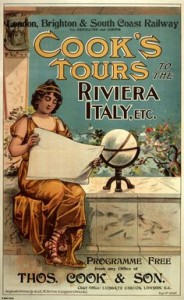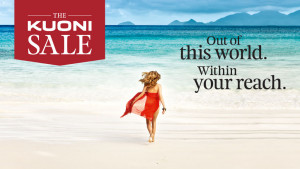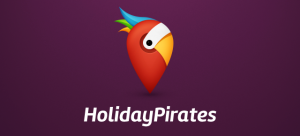The Origins of a Package Holiday
The small amount of people from the UK who went abroad before World War II did not go off in search of the sun. Instead, they went on adventure treks or to improve their mental capabilities. Trips abroad were relatively exclusively to the wealthy, with the introduction of a Grand Tour concept in the 18th Century. Gradually, staycations became popular when the railways were built in the 18th century, with Thomas Cook organising a trip from Leicester to Loughborough. Just 14 years later, Mr. Cook was leading tours to Europe and eventually, around the world in 1872. By the early 19th century, skiing trips were a common fixture, with the Alps becoming a popular destination for British snow fans. 
The first World War stopped most people travelling abroad, but by 1918, commercial airlines were taking flight. By 1939, Thomas Cook began to advertise a week’s holiday in Cannes, France at the price of around £930 in today’s money. Once again, a war meant that tourism reached a standstill. However, in the late 1940s, the once-popular tour operators found a new market- soldiers who wanted to re-visit where they had fought. Travelling to Europe, which had been ravaged by war, wasn’t easy. A Russian man called Vladmir Raitz decided to create Horizon Holidays in 1950, but this company was different. Rather than have his customers make the 48 hour journey between London and Corsica by rail and sea, he would fly them instead. Raitz began chartering regular weekly flights to a French campsite, and as such, the package holiday was born. The flight took six hours, including a stop to refuel in Lyon. Soon, other travel companies such as Thomas Cook began following suit.
The Package Holiday Boom
Fast forward to the 1960s and hotel construction was the name of the game in the Mediterranean, especially in Spain. This was because General Franco saw tourism as a way to enlighten a ‘backwards’ nation. Also during this time, aircrafts were becoming faster and the economy was strengthening, as well as lifting restrictions on foreign currency. Coach and rail tours were still popular, but air travel really took off (pardon the pun!) as journey times to the likes of Mallorca were reduced to four, three and eventually two hours. The majority of people responsible for pioneering the package holiday trend was people who enjoyed the concept of travel themselves; Riviera Holidays was set up by a London taxi driver, for example. Canada based corporation Thomson decided to enter the UK market in 1965, purchasing the likes of Riviera Holidays and other package operators. The company also acquired a charter airline, Britannia, and begun taking delivery of new Boeing jets. Soon, Thomson Holidays would become the leader of the package holidays market, after the crash of a rival company, Clarksons. Clarksons grew rapidly in the 60s, taking on the ‘pile it high, sell it cheap’ mantra by funding the construction of hotels in resorts such as Benidorm. When Clarksons met its demise, many thought that would be the end of package holidays. However, despite the collapse, UK consumers were well into the habit of having their holidays taken care of in one simple package, lowering their expectations so that it wouldn’t matter if they were met with poor quality hotels and dingy surroundings, if the price was right.
The Rebellion
Some travellers were turning their nose up at the cheap ‘sun and sand’ offerings, but there were alternatives for them to choose from. Companies such as Time Off championed city breaks, whilst skiing holidays became the norm in the winter, with the same resorts offering mountain breaks in the summer. Adventure tour operators began to offer holidays to the likes of Africa and Asia, appealing to a new audience: people who had the money to spend, but wanted the organisation that came with booking a package holiday. A Swiss company, Kuoni, was leading the way for long haul package holidays, and new Boeing jets meant that journey times were becoming increasingly shorter. The jets also had 400 seats, which helped travel companies to cut prices and soon enough, holidays were affordable for everyone.
The Beginning of the End
In the 80s, new technology made reserving a place on holiday easier and lots of travel agents were popping up on the High Street. Just when it appeared that package holidays could be over, a company named Airtours came along with many new ideas such as trips to the Caribbean and cruise ships for the masses. In the meantime, Thomas Cook, Thomson and First Choice were buying lots of smaller companies and taking over. The 21st Century was set to see a continuation of package holidays, but the tragic terror attacks of September 11th, 2001 caused worldwide panic, and the travel industry suffered. Low cost airlines such as Easyjet and Ryanair were offering incredibly cheap fares to popular package holiday destinations, sparking a trend for ‘do it yourself’ holidays. Online companies offered hotels, transfers and car hire, so you didn’t miss out on anything. It was the internet that finally spelled the end of package holidays, with the big four companies becoming the big two, as Thomas Cook merged with Airtours and Thomson joined First Choice.
Today…
Thomson remains the leader of the travel market, but it will be replaced by the TUI brand next year. Package holiday operators still have a relatively low share of the market, but escorted tour operators are doing better by targeting middle aged people who have disposable income and look for organisation. There are also plenty of small companies who are offering niche package holidays, such as safaris or coach tours. 
There are plenty of online companies offering package holidays for an incredibly low cost, such as Holiday Pirates and Teletext Holidays. However, we recommend that you read the small print carefully, as you may find that the half-finished high rises of the 60’s is precisely where you end up…
Alternatively, for guaranteed package holidays with quality, book with the likes of Thomas Cook, Thomson or First Choice.



